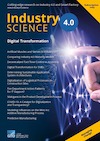Search


Bibtex
Cite as text
@Article{Gronau+Bender+Bertheau+Lauppe,
Cite-key = "Gronau2023Rob",
Year= "2023",
Number= "1",
Volume= "Industry 4.0 Science 39",
Pages= "120-125",
Journal = "Industry 4.0 Science",
Title= "Robotic Process Automation in Lieu of a New ERP System – The Reality Behind the Hype",
Author= "Norbert Gronau, Benedict Bender, Clementine Bertheau and Hannah Lauppe, University of Potsdam",
Doi= "https://doi.org/10.30844/I4SE.23.1.120",
Abstract= "Robotic Process Automation (RPA) stands for the software-supported
operation of software solutions via their user interface. The primary goal that RPA seeks to achieve is the automated execution of routine tasks that previously required human intervention. However, the potential of RPA
to improve processes in the long term is very limited. Automating processes and bridging front-end media disruptions leads to a variety of dependencies and conditions, which are summarized in this article. The path to a sustainable enterprise architecture (and the processes and systems
comprised therein) requires open, adaptive systems with modern
architecture that are characterized by a high degree of interoperability at various levels.",
Keywords= "ERP, Robotic Process Automation, RPA, process integration, automation, bot optimization, Robotic Desktop Automation,
RDA, unattended RPA, attended RPA",
}
Norbert Gronau, Benedict Bender, Clementine Bertheau and Hannah Lauppe, University of Potsdam(2023): Robotic Process Automation in Lieu of a New ERP System – The Reality Behind the Hype. Industry 4.0 Science 391(2023), S. 120-125. Online: https://doi.org/10.30844/I4SE.23.1.120 (Abgerufen 19.05.24)
Open Access
Abstract
Abstract
Robotic Process Automation (RPA) stands for the software-supported operation of software solutions via their user interface. The primary goal that RPA seeks to achieve is the automated execution of routine tasks that previously required human intervention. However, the potential of RPA to improve processes in the long term is very limited. Automating processes and bridging front-end media disruptions leads to a variety of dependencies and conditions, which are summarized in this article. The path to a sustainable enterprise architecture (and the processes and systems comprised therein) requires open, adaptive systems with modern architecture that are characterized by a high degree of interoperability at various levels.
Keywords
Schlüsselwörter
ERP, Robotic Process Automation, RPA, process integration, automation, bot optimization, Robotic Desktop Automation, RDA, unattended RPA, attended RPA

 Deutsch
Deutsch